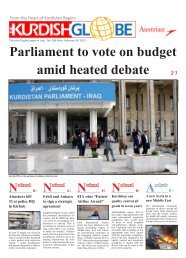KDP confirms government rotation - Kurdish Globe
KDP confirms government rotation - Kurdish Globe
KDP confirms government rotation - Kurdish Globe
Create successful ePaper yourself
Turn your PDF publications into a flip-book with our unique Google optimized e-Paper software.
The <strong>Kurdish</strong> <strong>Globe</strong> No. 335, Saturday, January 07, 2012 7<br />
Government to close unlicensed<br />
pharmacies and clinics<br />
Some fear more pressure on hospitals<br />
As part of efforts to<br />
revamp Kurdistan’s<br />
health system, more<br />
than 4,000 illegal<br />
pharmacies and<br />
unlicensed<br />
neighborhood clinics<br />
will be closed down,<br />
said Khalis Qadir,<br />
spokesman for<br />
Kurdistan’s Ministry<br />
of Health.<br />
“Our teams are working<br />
now to close down the illi<br />
legal pharmacies,” said Qadi<br />
dir. “The pharmacies have<br />
to work according to the<br />
law from now on.” He said<br />
only pharmacists should<br />
run pharmacies and that it<br />
is up to the Syndicate of<br />
Pharmacists to ensure pharmi<br />
macies adhere to the new<br />
guidelines.<br />
Qadir said the sale of<br />
drugs by persons other than<br />
trained pharmacists will be<br />
“harmful” as many individui<br />
uals have been affected by<br />
improper prescriptions and<br />
use of drugs.<br />
The <strong>government</strong> has notifi<br />
fied pharmaceutical compi<br />
panies and wholesalers not<br />
to sell drugs to unlicensed<br />
neighborhood pharmacies<br />
and clinics. Only the graduai<br />
ates of pharmacy schools<br />
and assistant pharmacists<br />
will be allowed to set up<br />
pharmacies and they will<br />
only dispense medicine to<br />
patients based on prescripti<br />
tions from doctors.<br />
Some citizens are unhappi<br />
py with the <strong>government</strong>’s<br />
decision.<br />
Zardasht Mirza believes<br />
neighborhood clinics and<br />
pharmacies are necessary<br />
because “without these<br />
clinics, we will need to go<br />
to doctors and there will be<br />
a lot more pressure on hospi<br />
pitals.”<br />
Neighborhood clinics and<br />
pharmacies in Kurdistan<br />
are generally run by medici<br />
cal staff such as physicians’<br />
assistants, not licensed physi<br />
sicians or pharmacists.<br />
Barzan Abu Zed Ali, diri<br />
rector of East Emergency<br />
Hospital in Erbil, says the<br />
closure of neighborhood<br />
pharmacies and clinics will<br />
not increase the burden on<br />
emergency rooms at hospiti<br />
tals.<br />
The head of the Syndici<br />
cate of Health Professionai<br />
als, Zana Khalid, said his<br />
organization will oppose<br />
any <strong>government</strong> decision to<br />
close down neighborhood<br />
clinics and pharmacies opei<br />
erated by health professionai<br />
als. He said according to<br />
the ministry’s instructions,<br />
health professionals have<br />
the right to have private<br />
health-related businesses<br />
after completing their hours<br />
at <strong>government</strong> hospitals.<br />
It is mandatory for health<br />
professionals in Kurdistan<br />
have to serve in <strong>government</strong><br />
health institutions but they<br />
can have their own busini<br />
nesses in their free time.<br />
By Salih Waladbagi<br />
A pharmacist arranges medicine in his pharmacy in Erbil. File photo.<br />
GLOBE PHOTO/ Safin Hamed<br />
Rising generator fees compound<br />
electricity problems<br />
Reduced national power supply increased costs<br />
Complaints about<br />
increasing monthly<br />
back-up generator<br />
fees have increased<br />
in Kurdistan<br />
Region in the first<br />
month of 2012.<br />
Due to the reduced national<br />
power supply since late Deci<br />
cember 2011, the owners<br />
of the back-up generators<br />
supplying power when grid<br />
power is off have raised<br />
their fees significantly and<br />
have set a record-breaking<br />
rate of 10,750 Iraqi dinars<br />
(approximately $9) per ampi<br />
pere per month.<br />
The news was shocking to<br />
residents of Erbil and they<br />
raised their voice of protest<br />
and the Committee on the<br />
Follow Up of Private Genei<br />
erators was informed about<br />
the situation.<br />
The committee organized<br />
a joint press conference<br />
with authorities from the<br />
Kurdistan Regional Govei<br />
ernment’s Ministry of Electi<br />
tricity to give some clarifici<br />
cation to an angry public.<br />
Though it did not change<br />
the rate, it explained duri<br />
ing the press conference<br />
that 2,000 ID of the 10,750<br />
ID was for December 2011<br />
which was not collected befi<br />
fore the end of the year.<br />
Committee chairman Qari<br />
raman Mawlood said the<br />
January rates were set to<br />
8,750 ID per amp per month<br />
for supplying electricity to<br />
households for seven and a<br />
half hours per day.<br />
Regarding the 2,000 ID<br />
charge, Mawlood says this<br />
is the fee for the supply of<br />
December that compensatei<br />
ed the hours during which<br />
national electricity supply<br />
was cut.<br />
“If people were informed<br />
about this issue in advance,<br />
I believe this misundersi<br />
standing and escalation<br />
would not have happened,”<br />
explained Mawlood in a<br />
<strong>Globe</strong> interview.<br />
“I have never paid 43,000<br />
ID for 4 amps of electrici<br />
ity,” said a street vendor<br />
who was selling vegetables<br />
and fruit a few hundred<br />
meters from the Erbil Govei<br />
ernorate building. “This is<br />
not to mention the national<br />
electricity charges, house<br />
rent, food and clothing for<br />
our children.”<br />
A woman in black who<br />
was buying tomatoes from<br />
the vendor said the govei<br />
ernment is acting against<br />
the poor instead of helping<br />
them out.<br />
Suleiman Aziz, a journali<br />
ist who reports on people’s<br />
daily problems, says the<br />
public should not pay for<br />
the <strong>government</strong>’s actions<br />
and inabilities.<br />
“The <strong>government</strong> was<br />
supposed to supply electrici<br />
ity to the public, but now as<br />
it cannot, it should provide<br />
fuel to generator owners to<br />
remove the burden from the<br />
people and prevent them<br />
from paying higher chargei<br />
es,” said Aziz.<br />
Mawlood, on the other<br />
hand, says the <strong>government</strong><br />
supplies subsidized fuel to<br />
generator owners to control<br />
the prices and that it has inci<br />
creased the amount of fuel<br />
since February 2011 and it<br />
has had a significant positi<br />
tive impact.<br />
“We are currently distribui<br />
uting fuel twice a month,<br />
and the governorate is tryi<br />
ing to persuade the Council<br />
of Ministers to further inci<br />
crease the amount of subsidi<br />
dized fuel for generators,”<br />
stated Mawlood.<br />
This effort by the govei<br />
ernment comes at a time<br />
when the KRG Ministry of<br />
Natural Resources failed to<br />
provide Ministry of Electi<br />
tricity with sufficient fuel<br />
for power production that<br />
resulted in reduced national<br />
power supply.<br />
Mawlood admitted it canni<br />
not do anything to reduce<br />
the 10,750 ID for January,<br />
but he was optimistic that<br />
the governorate’s effort is<br />
most likely to work and<br />
prices would go down in<br />
February.<br />
However, the problem is<br />
not the same everywhere<br />
in Erbil, as some neighbi<br />
borhoods have better relay<br />
stations installed that bear<br />
higher loads and do not enci<br />
counter problems frequentli<br />
ly. Some of those neighbi<br />
borhoods get 20 hours of<br />
national power per day and<br />
the remaining four hours is<br />
covered by back-up genei<br />
erators, for which they are<br />
charged only 500 ID, while<br />
some other neighborhoods<br />
have exhausted power netwi<br />
works and their supply is<br />
turned off from time to time<br />
to prevent faults, which<br />
means they need more<br />
back-up power, and they<br />
need to pay more.<br />
To solve this issue, Yassi<br />
sin Siddiq, director of Erbil<br />
Power Distribution Directi<br />
torate, says that a tender to<br />
purchase 73 relay stations<br />
has been approved though<br />
the governorate, and that<br />
the project is being implemi<br />
mented.<br />
This comes at a time when<br />
103 relay stations in Erbil<br />
are faulty.<br />
During sessions of the<br />
Kurdistan Parliament regi<br />
garding the 2011 budget,<br />
Parliament decided the<br />
revenues of the Ministry of<br />
Electricity would be used<br />
for the ministry itself to<br />
solve electricity problems<br />
and develop the electrici<br />
ity infrastructure in the<br />
Region. Parliament also<br />
allocated the largest share<br />
in the budget to electrici<br />
ity ministry projects of 603<br />
billion ID (approximately<br />
$500 million).<br />
Despite this, electricity is<br />
still an issue in the Region<br />
and majority of problems<br />
are still unresolved.

















